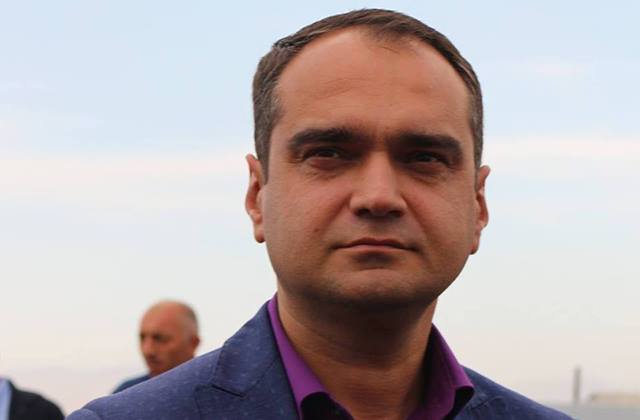“Armenia doesn’t Put its Words into Action in Relations with Georgia”

Interview with Arnold Stepanyan, head of “Multinational Georgia” civil movement.
Mr. Stepanyan, Tinatin Khidasheli, Georgia’s Minister of Defense, stated that Armenia’s choice decides the level of cooperation of Georgia with that country—friendly, but not strategic. She stated this at the trilateral meeting of the ministers of defense of Turkey, Azerbaijan and Georgia held in Gabala, Azerbaijan, during which it has also been announced on joint military trainings to be held for rising combat readiness of the armed forces of Azerbaijan, Turkey and Georgia. Thus, does Armenia’s membership to CSTO and EEU obstacle the development of Armenia-Georgia ties, as on highest level doubt is expressed on Armenia-Georgia relations?
First of all I’d like to state that Armenia-Georgia military cooperation, despite their contrasting geo-political choices, is successive: we succeed to develop them—joint military trainings, programs are being launched. In particular, Armenia and Georgia work jointly within NATO, cooperation is available here as much as possible. Georgia isn’t a participant of CSTO format, and it won’t be in near future, thus there is no cooperation within this format. Azerbaijan is rather active in that field, as it cooperates with Turkey, which everywhere lobbies Azerbaijan’s interests. Naturally Georgia pursues more interests in this format, as is strives to engage with NATO. For Georgia It’s much easier to work with Azerbaijan. However, let me state once again, despite Armenia’s membership to CSTO, Armenia succeeds implementing programs with NATO and Georgia, which is not bad, I think. Armenia shouldn’t treat Azerbaijan-Georgia cooperation and relations zealously, as it was the decision of Armenia’s authorities to join CSTO, and in this regard, the Armenian party shouldn’t submit claims to Georgia. They were expected and anticipated, thus, the present-day picture is rather natural.
Current Armenia-Georgia relations are much criticized and responsibility lies on non-professionalism of Yuri Vardanyan, RA Ambassador to Georgia. What’s your assessment to the work of our Embassy? Is there any guilt of the Embassy that Armenia-Georgia relations aren’t reaching reach higher level of development?
Yes, it’s being much criticized. That would be proper to criticize by arguments; I can’t provide details, as I’m not informed of the activity of the Embassy to speak concretely.
Is everything possible implemented by Armenia, so that Armenia’s foreign policy didn’t hinder Armenia-Georgia relations?
It’s difficult to act in a way that it didn’t obstacle, however, this is not the dividing line, which may lead to the collapse of Armenia-Georgia relations, i.e. as time has showed it was not the topic to damage Armenia-Georgia relations. Georgia realizes very well why Armenia made that choice, and they understand in Armenia why Georgia took that direction. As much as I’m informed, political elites of the two attempt to develop relations at currently available points, out of present-day realities. I don’t think that Armenia-Georgia relations will be damaged. Although it doesn’t mean that ties will be developed as intensively as Georgia’s relations with the states, which made other choice.
Georgia’s partnership is intensive with Turkey and Azerbaijan, including the military field, which raises some concern among the Armenian society from time to time. In your opinion, which are the follow-ups of Armenia’s authorities to make that cooperation safer, so that cooperation was more secure for the Armenian side?
I don’t observe any threats, as the countries work jointly, as they have the same direction for development. I’ll give general answer to that question: Armenia’s policy towards Georgia is not effective. As we see, in practice Armenia doesn’t put its words into actions, it doesn’t pay attention to the development of comprehensive relations with Georgia. As we know, it’s enshrined in Armenia’s security concept that relations with Georgia are strategic, meanwhile it isn’t observed in practice, it’s not observed that Georgia and Armenia pursue other interests than transit maintenance. Attitude towards the Armenian community isn’t productive either, as Georgia is another country and work should have been performed with the community here. However, the same governance system inside Armenia is being applied.
By Araks Martirosyan

























